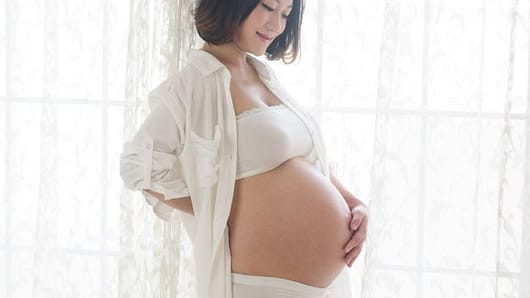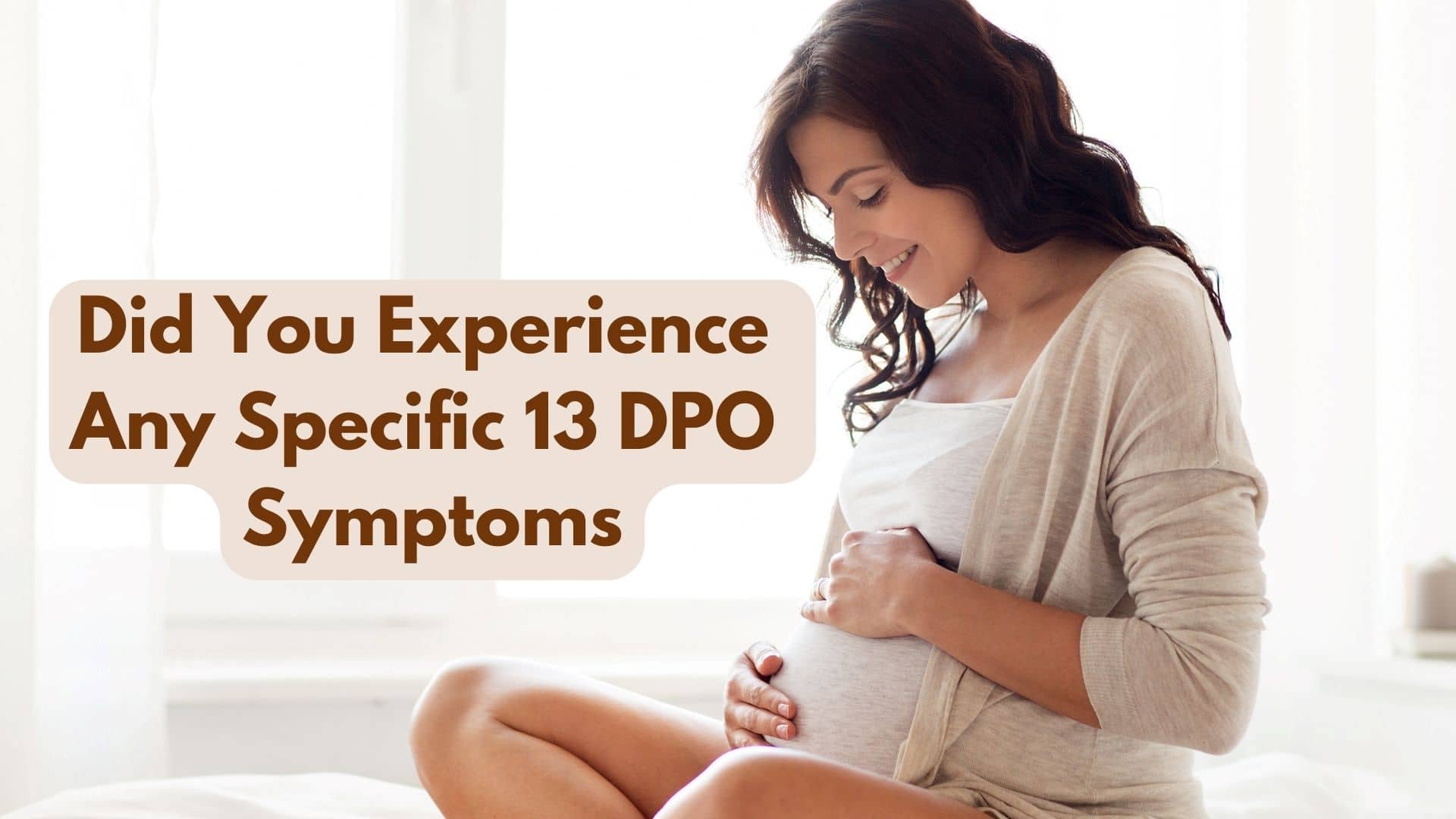Have you ever wondered if there are any specific symptoms you should be on the lookout for around 13 days past ovulation? In this article, we’ll be exploring the possible signs and sensations that you might experience during this crucial period in your menstrual cycle.
As we all know, our bodies can work in mysterious ways, and understanding the subtle nuances of these symptoms could shed light on whether or not you’re expecting. So grab a cup of tea, relax, and let’s dive into the realm of 13 DPO symptoms together!
What is 13 DPO?
13 DPO stands for 13 days past ovulation, which refers to the number of days after ovulation that a woman might experience different symptoms. It is an important milestone for women who are trying to conceive as it is around this time that a pregnancy test may be able to detect the presence of the pregnancy hormone hCG (human chorionic gonadotropin) in the body. However, it is important to note that every woman’s body is unique, and symptoms experienced at 13 DPO can vary widely.
Common Symptoms at 13 DPO
Early signs of pregnancy
At 13 DPO, some women may start experiencing common early signs of pregnancy. These can include breast tenderness, slight bloating, and mild cramping. These symptoms occur as a result of hormonal changes in the body and can be one of the first indications that a woman may be pregnant. However, it’s important to remember that these symptoms can also be attributed to other factors, such as PMS (premenstrual syndrome).
Menstrual cramps or implantation cramps
Some women may experience menstrual-like cramps or implantation cramps at 13 DPO. These cramps are caused by the implantation of the fertilized egg into the uterine lining, which can cause mild discomfort. It is important to note that some women may mistake these cramps for the onset of their menstrual period.
Breast changes
Changes in breast sensations, such as tenderness, swelling, or sensitivity, are common at 13 DPO. These changes occur as a result of increased levels of hormones, particularly estrogen and progesterone, which prepare the breasts for potential pregnancy and breastfeeding.
Fatigue
Feeling more tired than usual is another common symptom at 13 DPO. Increased levels of progesterone in the body can contribute to feelings of fatigue and exhaustion. It is important to listen to your body and rest when needed during this time.
Nausea or morning sickness
While morning sickness typically occurs later in pregnancy, some women may start experiencing mild nausea or queasiness at 13 DPO. Hormonal changes and increased sensitivity to smells can trigger these symptoms. However, it’s important to keep in mind that these symptoms can also be attributed to other factors, such as an upset stomach.
Increased urination
At 13 DPO, some women may notice an increase in their need to urinate. This occurs as a result of increased blood volume and hormonal changes in the body. The kidneys may be working harder to filter waste products, leading to more frequent trips to the bathroom.
Mood swings
Fluctuating hormones can also contribute to mood swings at 13 DPO. It is common for women to experience heightened emotions, ranging from joy to irritability, during this time. It is important to practice self-care and communicate with loved ones to navigate these emotions effectively.
Food cravings or aversions
Cravings for specific foods or aversions to certain smells or tastes can also be experienced at 13 DPO. Hormonal changes can affect a woman’s sense of smell and taste, leading to changes in food preferences.
Headaches or dizziness
Some women may experience headaches or dizziness at 13 DPO. These symptoms can be caused by hormonal changes, increased blood volume, or changes in blood pressure. It is important to stay hydrated and rest when needed to alleviate these symptoms.
Heightened sense of smell.
At 13 DPO, some women may notice that their sense of smell becomes more sensitive. This can be attributed to hormonal changes in the body. Everyday scents may become more overpowering or certain smells may trigger feelings of nausea.
Also Check: Signs Your Toddler Needs A Comfy Pillow?
Less Common Symptoms at 13 DPO
Spotting or light bleeding
While not as common, some women may experience spotting or light bleeding around 13 DPO. This can be attributed to implantation bleeding, which occurs when the fertilized egg burrows into the uterine lining. It is important to monitor any bleeding and consult a healthcare professional if it becomes heavy or is accompanied by severe pain.
Lower back pain
Lower back pain can also be experienced at 13 DPO. This discomfort can be attributed to hormonal changes and the ligaments in the pelvic area stretching to accommodate a potential pregnancy.
Vaginal discharge changes
Changes in vaginal discharge consistency, color, or amount can occur at 13 DPO. Some women may notice an increase in discharge, while others may experience a decrease. These changes are a result of hormonal fluctuations.
Constipation or diarrhea
Digestive changes, such as constipation or diarrhea, can occur at 13 DPO. Hormonal changes can affect the muscles in the digestive system, leading to changes in bowel movements. It is important to stay hydrated and eat a balanced diet to support digestive health.
Abdominal bloating or gas
Abdominal bloating or gas can be experienced at 13 DPO. Hormonal changes can affect digestion, leading to feelings of bloating and increased gas production. These symptoms are generally mild and temporary.
Skin changes
Some women may notice changes in their skin at 13 DPO. Hormonal fluctuations can contribute to acne breakouts or changes in skin texture. It is important to maintain a gentle skincare routine and consult a dermatologist if needed.
Increased body temperature
A slight increase in body temperature can be observed at 13 DPO for some women. This can be attributed to the rise in progesterone levels, which can cause a slight elevation in basal body temperature.
Frequent urination
Increased frequency of urination can continue to be a symptom at 13 DPO. The increased blood volume and hormonal changes can put pressure on the bladder, leading to more frequent trips to the bathroom.
Changes in libido
Some women may experience changes in their libido at 13 DPO. Hormonal fluctuations can affect sexual desire and arousal. It is important to communicate with your partner and discuss any changes or concerns during this time.
Sore or darkened nipples
Soreness or darkening of the nipples may occur at 13 DPO. This can be attributed to hormonal changes and increased blood flow to the breasts. It is important to wear comfortable bras and practice proper nipple care during this time.

How accurate are symptoms at 13 DPO?
Varies from person to person
The accuracy of symptoms experienced at 13 DPO can vary greatly from person to person. Every woman’s body is unique, and factors such as hormone levels, overall health, and individual sensitivities can influence the presence and severity of symptoms.
May be influenced by other factors
It is important to note that symptoms experienced at 13 DPO can also be influenced by other factors, such as stress, illness, or medication. These external factors can mimic pregnancy symptoms or affect hormonal balance in the body.
Importance of confirming with a pregnancy test
While symptoms can provide insights into a potential pregnancy, the most accurate way to determine pregnancy at 13 DPO is through a pregnancy test. These tests detect the presence of hCG in the body, which is the hormone produced during pregnancy. If you suspect you may be pregnant, it is recommended to take a pregnancy test to confirm.

Source: TheTechBrain AI
Frequently Asked Questions (FAQs)
What does DPO stand for?
DPO stands for “days past ovulation.” It is a term used to measure the number of days that have passed since a woman ovulates. Tracking DPO can help determine the potential stage of pregnancy or indicate when it is appropriate to take a pregnancy test.
Can you have pregnancy symptoms this early?
Yes, it is possible to experience pregnancy symptoms as early as 13 DPO. However, it is important to remember that every woman’s body is unique, and symptoms can vary greatly. Some women may experience symptoms earlier, while others may not experience any symptoms until later in their pregnancy.
What is implantation cramping?
Implantation cramping refers to mild abdominal discomfort or cramps that some women may experience when the fertilized egg implants into the uterine lining. These cramps are typically milder than menstrual cramps and can occur around 13 DPO.
How soon can I take a pregnancy test?
The timing of when to take a pregnancy test depends on the sensitivity of the test being used. Some tests can detect pregnancy hormones as early as 6-8 days after ovulation, while others may require a higher concentration of hormones and therefore need to be taken later. It is best to refer to the instructions provided with the specific pregnancy test you are using.
Conclusion
Experiencing various symptoms at 13 DPO can be an exciting and sometimes nerve-wracking time for women who are trying to conceive. It is important to remember that every woman’s body is unique, and symptoms can vary significantly. While the presence of symptoms can indicate a potential pregnancy, it is crucial to confirm with a pregnancy test for accurate results. If you have any concerns or questions about your symptoms or potential pregnancy, it is always recommended to consult a healthcare professional for guidance and support.
